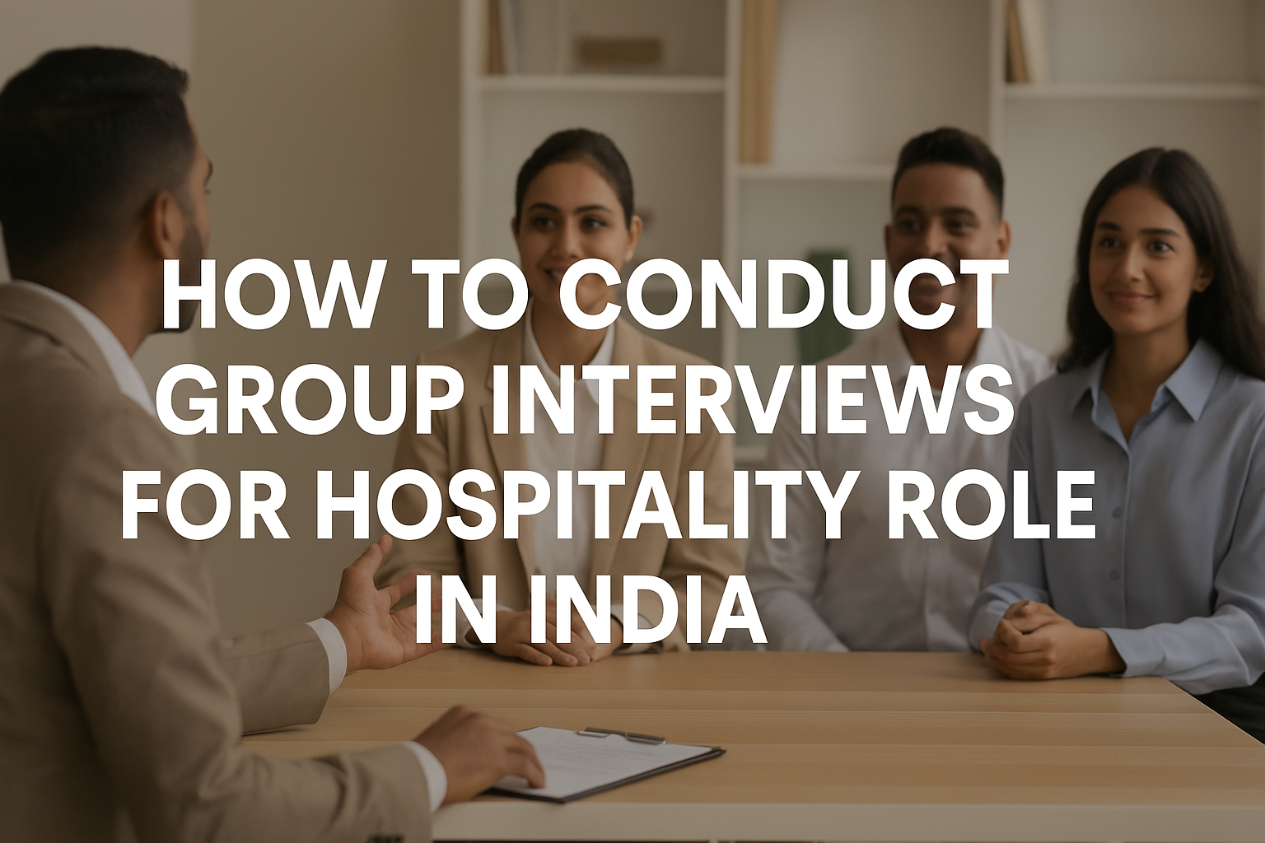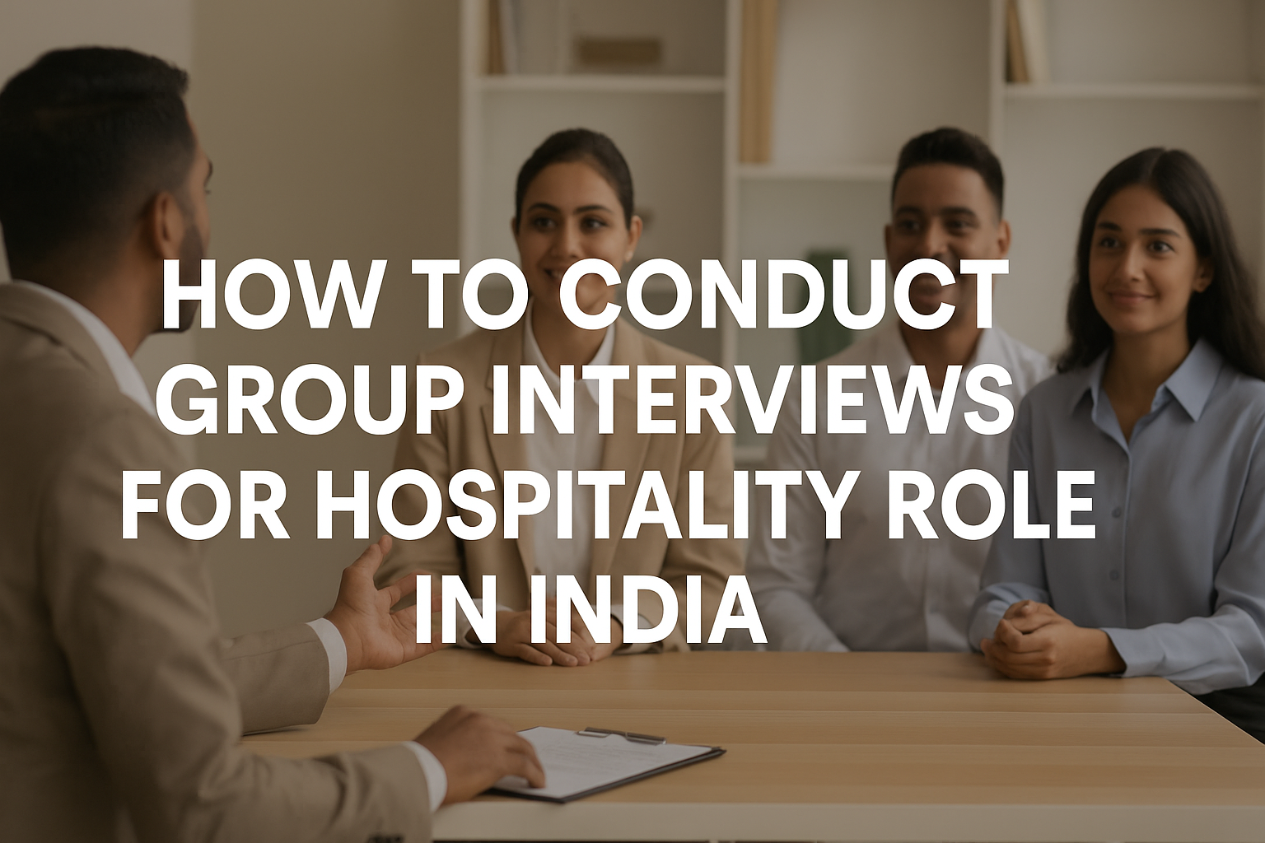
How to Conduct Group Interviews for Hospitality Roles in India

Recruiting for the hospitality sector within India requires more than just a review of a résumé. It means understanding the personality, presentation, and interpersonal skills of a candidate 'in the moment', because in hospitality, the guest-facing moment is everything. Therefore, as hospitality recruitment expands across India, including hotels, restaurants, resorts, and quick-service brands, group interviews are becoming increasingly popular. When done right, group interviews provide a quick, animated and revealing way to assess a selection of candidates and identify those who can shine in a purposeful, enthusiastic, guest-focused, high-paced environment.
In the context of this article, we will address how hospitality recruiters and managers throughout India can prepare, deliver and improve group interviews, and do so in a manner that aligns with their professionalism, inclusivity or diversity approaches as well as brand.
Reasons Group Interviews are Effective in the Indian Hospitality Sector
The hospitality industry is all about teamwork, communication, and customer interactions. One-on-one interviews often don't take into account how candidates work under social pressure or with a group - those components play a vital role in guest services, restaurant service, and team coordination and cohesion. Group interviews provide a real-time analysis of anything verbal and non-verbal.
In one session, employers can see how a candidate makes decisions on the fly, their approach to teamwork, their ability to resolve conflict or take charge, which again is imperative for the Indian hospitality industry, where speed and empathy are often needed in tandem.
Moreover, as the booming hospitality industry in India often requires large-scale recruitment - for instance seasonal peak tourist periods or new outlet launches - it is an efficient mechanism. During one well-timed session, recruiters can more quickly screen eight to ten candidates in just one hour, and with no decrease in quality of hire or time to hire.
Conclude with Definite Role Profiles
The basis of a successful group interview begins with clarity. Before you schedule your session, determine the requirements for the role, not just the qualifications. Take hiring a front office executive as an example. While hiring for this role, it would be reasonable to focus on presentation, voice quality, body language, and guest sensitivity. When hiring a banquet coordinator, it would be reasonable to focus on multitasking abilities, event coordination knowledge, and the ability to make decisions quickly.
Ensure you are clear about these objectives with your hiring team. Everyone involved in the process, not just the executive search consultant, should know what specific behaviours or skills to look for in the candidates, including HR, direct supervisors, department heads, etc.
Choose a Group Interview Format That Reflects the Role.
In hospitality/Hotel/recruitment, there is never a one-size-fits-all approach. Depending on the specific role, a group interview can take many forms, including how you want it to be structured. A group discussion is a good choice for supervisory positions, allowing the candidates to share ideas and thoughts about industry trends and ideas to manage a guest scenario that the candidate may be facing. It can also show what they say and how they listen and build on the ideas of others.
Role-playing is another useful technique, particularly for guest-facing roles. The candidates can be given a fictitious scenario to role play: an angry guest, a reservation that was never made, or the fish we sold last night is mysteriously missing from the daily menu. This type of interview, even if unstructured, allows recruiters to assess a candidate's poise, empathy in a situation and problem-solving skills on the spot!
Some employers also like group task challenges - for example, small teams that are asked to design a menu, in groups tackle a staffing or scheduling response or create a mock check-in and guest arrival process and subsequent service tasks. The outputs not only demonstrate the collaborative style and teamwork but also their leadership potential, laying out how they'll work with others under time constraints, in high-stakes or, if needed, high-pressure environments that are all too relevant to hotels and quick-service restaurant chains throughout India.
Organise the Interview without making it too Structured.
While creating some space for candidates to speak freely is important, having no structure can create disarray. Start the session with some sort of ice-breaker or welcome focus to allow candidates to settle into the interview. Describe to the candidates exactly who is in the interview panel, what you’d like the candidates to call you, and what type of structure/explanation of this session duration-wise, what the activities involved are, and what you expect from them.
There is a fine line between control and occurrence. The objective is to ascertain how candidates would behave normally, not how they would act in what they believe are controlled monologues. When control is necessary to steer the discussions back on track, recognise that you are a facilitator, not a controller.
Observe the Non-Verbal
Hospitality is often an unspoken indicator. The way a candidate positions themselves in a chair, engages with another person's opinion or embraces silence can tell you a lot. Some may not be the most talkative but may still exhibit outstanding listening, patience, and thoughtfulness. And these are all desirable traits in a back-of-house or recovery position.
Also, pay attention to grooming and civility. How a staff member enters the room, greets others, and presents themselves in terms of appearance will reflect hospitality standards. In India, guests will judge a hotel or restaurant based on how the employees appear and how they demonstrate the standards of hospitality through their body language. Grooming has cultural value and operational significance.
Another thing to observe is comfort with language. In urban centres and tourist destinations, not being fluent can have implications, but language fluency can be very relative for demographic-focused properties or regional domestic-facing business hotels. For example, fluency in Hindi or local languages such as Tamil, Marathi, Bengali or Telugu could be of greater value than strictly possessing a good deal of English fluency. Employers should consider when establishing the role the language context, and then should measure the candidates accordingly.
Ready to Transform Your Hospitality Hiring Process?
Group interviews can help you find hires smarter—but only with the right hiring platform. That's where Foodism Connect comes in. As a specialised hiring platform for the hospitality, food service, and culinary sector, Foodism Connect lets you:
Whether you are operating a five-star hotel, a cloud kitchen, or a growing café chain, Foodism Connect will streamline your hiring process so you can focus on what matters: delivering unforgettable guest experiences.
Related Blogs

Tourism Season Surge: How Travel Demand Fuels Hospitality Hiring
35 Views

Hiring for the F&B Frontier: Inside India’s Growing Bakery & Dessert Industry
34 Views
.png)
The Rise of Boutique Hotels: Recruiting for Experience, Not Size
34 Views

The Rise of Boutique Hotels: Recruiting for Experience, Not Size
127 Views

Top 5 Hospitality Roles Most in Demand This Quarter
149 Views